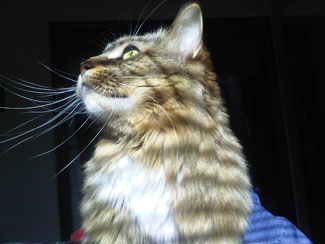
Dr. Phil Zeltzman is a mobile, board-certified surgeon in Allentown, PA. Find him online at www.DrPhilZeltzman.com. He is the co-author of “Walk a Hound, Lose a Pound” (www.WalkaHound.com).
Chris Longenecker, a Certified Veterinary Technician in Reading, PA, contributed to this article.
Mojo, a 14-year old cat, presented to the surgery consultation with a history of poor appetite and weight loss for 2 weeks. A physical exam was performed. Mojo was on the thin side but otherwise healthy. Because he was thin, a mass, likely attached to the intestine, was felt. Blood work showed no significant findings.
Radiographs confirmed that a mass was present in the belly. Since cancer had to be suspected, the next step was to take chest X-rays, to make sure it had not spread to the lungs. Chest X-rays did not show any sign of obvious spreading, but it did reveal a single lung mass. Again, based on statistics, it was mostly likely cancer.
Mojo’s owners, devastated, wanted to know more and decided to do an ultrasound. The ultrasound confirmed a mass in the intestine, with enlarged lymph nodes.
Based on this information, what would you do if you were the owner of this 14 year old cat, with a suspicion of cancer in the chest and the belly?
I suspect that most owners would take Mojo home, give him a big comfy bed to sleep in, feed him anything he would want to eat and plenty of catnip toys to play with.  But Mojo’s owners did not choose that option. They elected surgery to remove both masses.
But Mojo’s owners did not choose that option. They elected surgery to remove both masses.
Now, here is where my ethical dilemma as a surgeon comes up. Even though I’m the first one to say that "age is not a disease", is it fair to do surgery on a 14 year old cat who is sick and is likely to have cancer in the chest and the belly? Is it humane to put a cat through a double, invasive surgery?
Since I knew we could provide safe anesthesia and excellent pain management, we decided to proceed with surgery.
We first performed open chest surgery and found a single mass in a lung lobe, which was removed. We then performed abdominal surgery and discovered a large mass involving the last part of the small intestine, the appendix, and the beginning of the large intestine. In addition, local lymph nodes were enlarged. Because of the possibly drastic consequences of this surgery (including ongoing diarrhea) I decided to call the owner in the midst of surgery to have a heart to heart. Despite the risk of diarrhea, they encouraged me to remove the mass - which we did successfully.
The end of the small intestine was sutured to the beginning of the large intestine. What was striking is that the mass was blocking 99% of the diameter of the intestine. No wonder Mojo wouldn’t eat or defecate!
We sent the biopsies out to the lab. Mojo recovered nicely after surgery and went home only two days after surgery.
About a week later, the biopsies confirmed two different types of cancer in the lung (broncho-alveolar carcinoma) and the intestine (adenocarcinoma). The mesenteric lymph node showed metastatic adenocarcinoma.
Mojo's owners were compassionate and realistic at the same time. They wanted to improve Mojo’s quality of life, even if it was for a short period of time. Based on a long conversation with them, and convinced that we could keep Mojo comfortable before, during and after surgery, we agreed to do the double operation.
The amazing part of this story is that Mojo was a cancer survivor for 14 months - without the benefit of chemotherapy - which is an extremely long time based on his (double) diagnosis.
When Mojo’s quality of life started to decrease significantly, his owners chose euthanasia to allow him to pass away with dignity. They were extremely grateful for the extra quality time they were able to spend with their beloved cat.
If you have any questions or concerns, you should always visit or call your veterinarian – they are your best resource to ensure the health and well-being of your pets.
